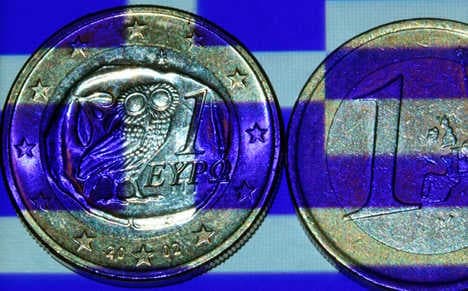Juncker: Greek exit manageable, but it'll hurt

Eurozone finance ministers' group chief Jean-Claude Juncker told a German broadcaster on Tuesday that a Greek exit from the eurozone would be "manageable" but not "desirable."
"The way things look now, it would be a manageable process," he told Germany's WDR public broadcaster, according to a transcript on the government website of Luxembourg, where Juncker is prime minister.
"That's not to say it would be a desirable occurrence because it would be linked to considerable risks, above all for the average person in Greece."
Germany, as the biggest EU funder of Greece's rescue packages, would stand to lose the most from a messy Greek euro exit and default on its bailout loans.
Asked whether Greece could, in theory, drop out of the 17-nation single currency bloc in two days' time, Juncker denied that would happen, adding: "In any case not before the end of autumn, and not even then."
Struggling with a fifth year of continuous recession, Greece has fallen behind in the implementation of structural reforms that are part of the EU-IMF bailout packages which are keeping its economy afloat.
Back-to-back elections in May and June resulted in a two-month political deadlock that got the country's reform programme off track, amid mounting international pressure.
German Economy Minister Philipp Rösler in late July voiced serious doubts about whether debt-mired Greece would be able to stay in the eurozone, saying the "horror" of a potential exit had worn off.
Rösler said that Athens' partners would wait for the progress report from the troika of Greek creditors – the European Union, International Monetary Fund and the European Central Bank.
"Nevertheless I have to say I am more than sceptical," said Rösler, who is also head of the pro-business Free Democrats (FDP), junior partners in Chancellor Angela Merkel's centre-right coalition government.
Juncker, who is due to visit Greece on August 22, also said that many in Germany, including some of the press, "talk about Greece in a way as if the people were not worthy of respect. That's not the case."
Some Greek newspapers, meanwhile, treat German Chancellor Angela Merkel "as if she were the successor of the Nazis," he said calling for members of the eurozone to be careful in their dealings with each other.
The Greek government has to cut €11.5 billion off expenditure over the next two years in order to unlock the next instalment of its €130 billion bailout package – the second for the cash-strapped country in two years.
But Greek Finance Minister Yannis Stournaras said Tuesday that the country's coalition government had yet to agree on about one-third of the needed spending cuts for 2013 and 2014 and that negotiations would continue until the end of August.
The troika's auditors are expected to return to Greece in September. Their report will determine whether the indebted country will receive the much-needed next tranche.
AFP/jcw
Comments
See Also
"The way things look now, it would be a manageable process," he told Germany's WDR public broadcaster, according to a transcript on the government website of Luxembourg, where Juncker is prime minister.
"That's not to say it would be a desirable occurrence because it would be linked to considerable risks, above all for the average person in Greece."
Germany, as the biggest EU funder of Greece's rescue packages, would stand to lose the most from a messy Greek euro exit and default on its bailout loans.
Asked whether Greece could, in theory, drop out of the 17-nation single currency bloc in two days' time, Juncker denied that would happen, adding: "In any case not before the end of autumn, and not even then."
Struggling with a fifth year of continuous recession, Greece has fallen behind in the implementation of structural reforms that are part of the EU-IMF bailout packages which are keeping its economy afloat.
Back-to-back elections in May and June resulted in a two-month political deadlock that got the country's reform programme off track, amid mounting international pressure.
German Economy Minister Philipp Rösler in late July voiced serious doubts about whether debt-mired Greece would be able to stay in the eurozone, saying the "horror" of a potential exit had worn off.
Rösler said that Athens' partners would wait for the progress report from the troika of Greek creditors – the European Union, International Monetary Fund and the European Central Bank.
"Nevertheless I have to say I am more than sceptical," said Rösler, who is also head of the pro-business Free Democrats (FDP), junior partners in Chancellor Angela Merkel's centre-right coalition government.
Juncker, who is due to visit Greece on August 22, also said that many in Germany, including some of the press, "talk about Greece in a way as if the people were not worthy of respect. That's not the case."
Some Greek newspapers, meanwhile, treat German Chancellor Angela Merkel "as if she were the successor of the Nazis," he said calling for members of the eurozone to be careful in their dealings with each other.
The Greek government has to cut €11.5 billion off expenditure over the next two years in order to unlock the next instalment of its €130 billion bailout package – the second for the cash-strapped country in two years.
But Greek Finance Minister Yannis Stournaras said Tuesday that the country's coalition government had yet to agree on about one-third of the needed spending cuts for 2013 and 2014 and that negotiations would continue until the end of August.
The troika's auditors are expected to return to Greece in September. Their report will determine whether the indebted country will receive the much-needed next tranche.
AFP/jcw
Join the conversation in our comments section below. Share your own views and experience and if you have a question or suggestion for our journalists then email us at [email protected].
Please keep comments civil, constructive and on topic – and make sure to read our terms of use before getting involved.
Please log in here to leave a comment.